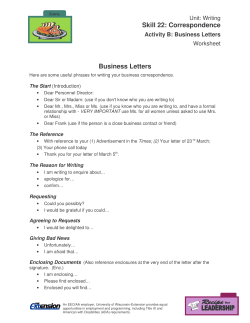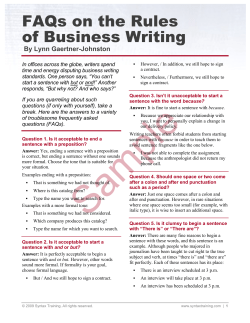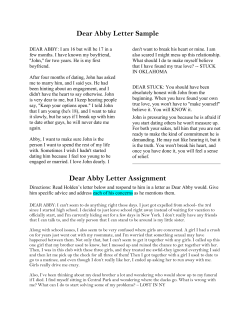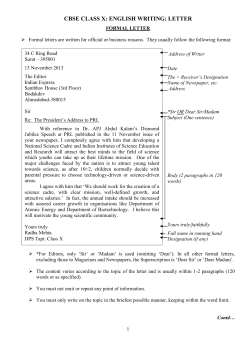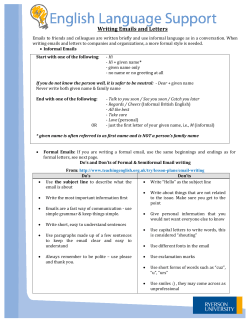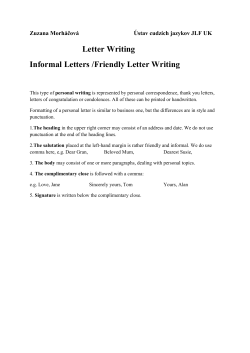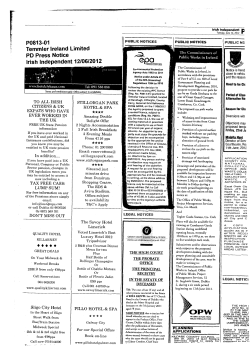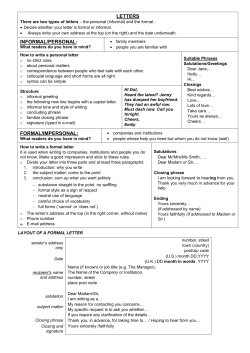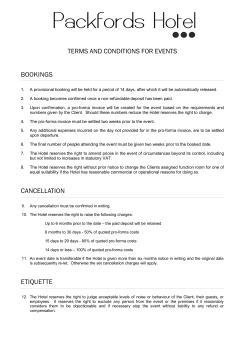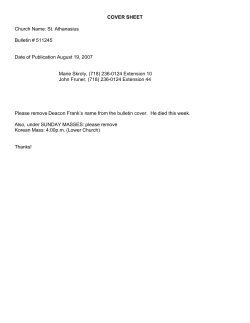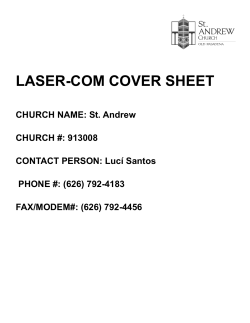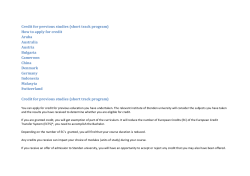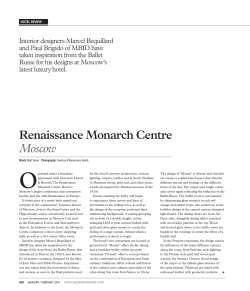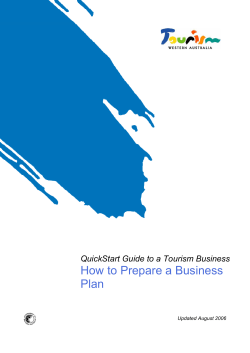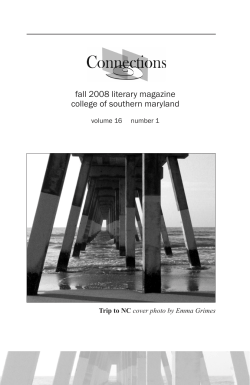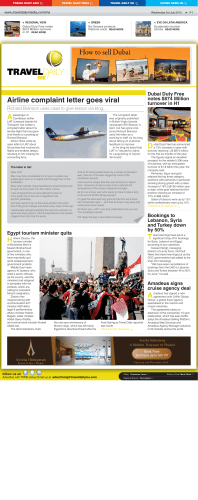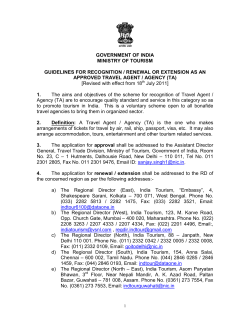
We have been told that ... unfortunately things do not work that way. People are guided... THE LAYOUT OF ENGLISH BUSINESS LETTERS
THE LAYOUT OF ENGLISH BUSINESS LETTERS
We have been told that we should not judge a book by its cover, but
unfortunately things do not work that way. People are guided by first
impressions, and in business letters the way we write may endanger the
chances of success of the most important business deal.
Of course, you may argue that all these rules are exaggerated, and
that in the age of faxes and e-mail people write in a much more informal
way. This may be true, but you must bear in mind that, before you move into
closer terms and become informal, a number of formal documents must be
exchanged.
The letter
1
1 (sender's address)
2 (date)
3 (addressee's address)
4 (salutation)
5 (body of letter)
6 (closing sentence)
7 (farewell)
8 (signature)
9 (name of sender and position)
10 (enclosures)
1. Sender's address (dirección del remitente)
Position: On the top right hand corner, if the letter is sent by an individual.
If the letter is sent by a firm, it should be in the middle, and is called
letterhead (membrete).
If the letter is sent by an individual, it should never contain his or her
name; the only place where the name of the sender can be seen is at the
bottom of the letter, after the signature.
1
English for Tourism Management - Dr. Campos
Letter writing
The sender's address should contain, on different right-hand aligned,
lines, the street, the city and postcode, and the country (only if the letter is to
be sent to a different country).
A note on addresses: addresses must not be translated. If you live in
Alfonso el Sabio, 19, you should not write *19, Alfonso el Sabio, but your real
address. Do not use strange abbreviations, such as C/, Avda. and so on.
2. Date
Dates can be written in different ways in English. Some of them are the
following:
November 19, 1998
November 19th, 1998
19th November 1998
19 November 1998
You may choose whichever form you like; however, you must be consistent,
and if you choose one format, you must continue using it if a date appears
within the body of the letter.
No abbreviations can be used here. Firstly, because they may be
confusing: 10/9/98 may be September 10th (in the UK) or October 9th (in the
USA). Secondly, because it is in extreme bad taste to abbreviate months
(Nov. Dec. and so on); it looks as if you do not want to waste your precious
ink. Remember also that months and days of the week are written with a
capital letter (May, November), and in Spanish they are not (diciembre,
mayo).
The year is compulsory in formal letters. However, do not insert a dot
after the first number (**1.989). This is wrong, both in English and in
Spanish.
3. Addressee's address (dirección del destinatario)
Write the name of the addressee, preceded by the title (Mr, Miss, Mrs, Ms,
etc.). English people give great importance to their titles; if a person has
written to you as Dr. Hannibal Lecter or Sir Adam Ant, respect this title.
1
English for Tourism Management - Dr. Campos
Letter writing
If you are writing to a woman and you do not know whether she wants
you to use Mrs or Miss, use always Ms. It is irrelevant whether she is
married or not and you know; if she feels that her marital status does not
affect her business activities, who are you to say otherwise?
If you are writing to a firm and you do not know who you are writing
to, start by the name of the Department (Sales Department, Customer
Services) and then continue with the firm and the address.
Be very careful with people´s names and addresses; try to spell all
words correctly, even if they are in a different language (be careful with
accents, diacritical signs, ß, ø, å, æ and so on. Write the name of all countries
and cities in English, if there is an English version (do not write München,
but Munich; not Sverige, but Sweden).
However, if a person chooses to write his name or address in his own
language, especially if it is a minority one, use it: if a person prefers to use
Gasteiz or Ourense and wants to be called Jon Ander or Xose (or Josep
Lluís), most probably he/she has gone through tons of paperwork and has
fought his own authorities, and will not allow you (a perfect stranger) to
translate it into Spanish. If a person will rather use Baile Àtha Cliath
instead of Dublin and Cymru instead of Wales, whatever you think about the
subject, the customer is always right.
4. Salutation (saludo)
You have the following possibilities:
Dear Mr, Mrs, Miss (surname),if you know the person's name and title.
Dear Sir or Madam,if you are writing to a person whose name you do not
know (The Sales Manager, The Staff
Secretary)1
Dear Sirs,If you are writing to a firm, or a department, and not to a specific
person.
1
By the way, remember that secretaries are not necessarily women, and managers are not
necessarily men.
1
English for Tourism Management - Dr. Campos
Letter writing
Other possibilities (Dear Sir, Dear Madam) cannot be used. If you
know a person's gender, it is because you know his or her name (unless you
can judge from the smell of the parfum in the envelope), and if you know a
person's name, you must use it. It is unpleasant to receive a letter starting
"Dear Sir," which could have been written to anyone.
After the salutation, you may use a comma (,) or nothing, but do not
use a colon (:). You may use a colon in American English, but if you do so,
ensure that the rest of the letter is in American English (gotten instead of
got, meter instead of metre, etc.). Otherwise, it will be considered and judged
as a Spanish-based mistake.
5. Body of letter (cuerpo de la carta)
Try to write no more than three or four paragraphs. The first paragraph
should refer the reader to the previous letter ("Thank you for your letter
of..."; "We have received your letter of...") or tell the reader where you found
out about them ("I read an advertisement for your firm in Información). Do
not say your name here.
The second paragraph should state the action to be taken or what you write
the letter for; the third one is meant to encourage further contact.
Leave one line between paragraphs, and start each paragraph a couple of
centimetres from the left hand margin. Leave wide margins, and watch your
handwriting: graphologists are very good at discarding job application after
deciding that you are not reliable after a glance at your handwriting.
A few things must be remembered about the style:
- if you are writing on behalf of a firm, decide whether you will use "I" or
"We". The latter is more advisable.
- do not use contractions, slang or familiar words or phrasal verbs (if you can
avoid them);
- try not to use the verb get. Find a suitable alternative (obtain, receive,
collect...)
- do not split words, unless you have a dictionary to tell you where you can do
so (words are divided in English not according to their
pronunciation, but to their grammar).
1
English for Tourism Management - Dr. Campos
Letter writing
- do not be rude. Do not use imperatives or direct questions; use sentences
like we would be grateful if you could, it would be very helpful if
you could, etc. Never use must.
- do not write excessively long sentences or letters. That is a Spanish bad
habit.
6. Closing sentence. (frase de cierre)
This is the place to use the usual "We shall be looking forward to hearing
from you". Remember that it must be hearing and not hear.
The sentence may have different variations:
We shall be looking forward to your reservations.
I shall look forward to being of assistance to you.
7. Farewell
There are only two options: yours sincerely and yours faithfully. Their usage
depends on the salutation: if you used Dear Sir or Madam or Dear Sirs, you
must use yours faithfully. If you used dear Mr/Sir/Miss xxxx, you must use
yours sincerely. Be careful: it is yours and not "your" and there is only one l
in sincerely.
In some cases, "Best regards" may be acceptable.
8. Signature
In general, signatures in English are handwritten samples of your name (of
course, a formal letter should be signed with your name and surname).
Illegible signatures, like the ones we are used to in Spain, are simply not the
case.
Two Spanish habits should be carefully avoided. One, the "rúbrica",
the kind of line drawn after writing your name. As it does not exist in
English, it gives the impresion that your signature has been crossed out, and
in fact, a cheque signed like that would not be valid. The other, the two
vertical lines (") drawn upon the "rúbrica".
1
English for Tourism Management - Dr. Campos
Letter writing
You may have decided, at this stage, that your signature includes all
the defects in the world. If so, this is a good time to change it; your signature
will look much more mature, and you will have an added advantage: it will
fit within the strip on the back of your credit card.
9. Name and position
If you are an individual, write here your name and surname, followed
between brackets by (Mr), (Ms), (Miss) or whichever treatment you want to
be given. This is necessary; English people may not know if your name is a
male or a female one.
If you are writing on behalf of a firm, write your position (General
Manager, Sales Representative) under your name.
10. Enclosures (anexos)
This section is optional: it should only be added if you have enclosed
anything else within the envelope (leaflets, price lists, bills, etc.). There are
four possibilities:
* If you said what you were enclosing in the body of the letter, and there was
only one thing (e.g. there was a sentence saying "I am enclosing
a copy of the price list"), just write Enc.
* If you said what you were enclosing in the body of the letter, and there
were several things, all of which you mentioned (e.g. there was a
sentence saying "I am enclosing a copy of the price list and a
discount voucher"), write Enc: 2. (or the number)
* If you said in the body of the letter that you were enclosing something, but
you did not say what, thing (e.g. there was a sentence saying "I
am enclosing some promotional material"), write Enc: and what
you are enclosing. Example:
Enc: discount voucher
price list
timetable
* If you did not say in the body of the letter that you were enclosing
1
English for Tourism Management - Dr. Campos
Letter writing
something, do the same as in the previous case.
1
English for Tourism Management - Dr. Campos
Letter writing
Now that you know what to do, you may practice with the following
examples:
1. Una familia, clientes de tu agencia, quiere hacer un viaje a Nueva
Zelanda. Vosotros no lo tenéis en catálogo, pero escribe una carta al
mayorista Whole World Travel (45 Sicilian Avenue, London SE2 9IJ),
pidiendo que os reserven vuelo de ida y vuelta Londres-Wellington, hotel en
media pensión para un matrimonio y dos hijos (dos dobles con baño) del 20 al
29 de julio, así como visitas al Hell Lake District, al Kookaburra National
Park y a la isla Addams. Averigua si hace falta visado, pídeles confirmación
por fax en cuanto sea posible, y asegúrate del aeropuerto de salida.
2. Trabajas en Viajes Buenos Aires (Avenida del Cid Campeador, 03988
Orihuela, 29, Alicante). Escribe al mayorista World Wide Travel (39 High
Street South, Sydney, New South Wales, Australia) reservando un paquete
para cinco personas (dos matrimonios, uno de ellos con una hija de siete
años) en Kenya, que incluya vuelo Londres-Nairobi, habitaciones en un hotel
de Nairobi con baño a media pensión, safari guiado al Nashuru Park y
excursiones a la isla Adams. Pregunta si hace falta visado y algún tipo de
vacuna.
3. Tu agencia estuvo en la Feria del Turismo Exótico de Milán, y volvísteis
enamorados de Indonesia. Escribe al mayorista 1001 Nights Travel (Via
Rufino Mascalzone, 89, 59001 Macerata, Italia) pidiendo precios para
paquetes de quince días, incluyendo submarinismo, excursiones a los
templos de Bali, alojamiento, media pensión. Pregunta si hacen falta visados
y/o vacunas.
4. Trabajas en Viajes Gran Sol (Pintor Sorolla, 29, 03340 Benidorm,
Alicante). El mes pasado mandaste a unos clientes a ver el mundial de futbol
de Francia mediante el mayorista Voyages sans Limites (48, Rue de la Loi,
B-2938 Bruselas), y fue un auténtico desastre. La supuesta habitación con
baño del hotel tenía el baño fuera, y además estaba sucia. No se servían
desayunos (a pesar de que estaban incluidos en el precio), el hotel estaba
extremadamente lejos del centro, y un matrimonio del grupo fue enviado a
otro hotel porque no había bastantes habitaciones. Naturalmente, tus
clientes se han quejado, y quieren que les devuelvan el dinero o algún tipo de
indemnización, así que traslada la queja al mayorista, y exige que tomen
algún tipo de medida, o no volverás a trabajar con ellos.
1
English for Tourism Management - Dr. Campos
Letter writing
5. Your agency has received a letter of complaint from a very upset customer
(Gladys Jones, from Carrer de la Mar, 22, Xàtiva), whom you sent to Atlanta
to see the Games, and everything went wrong: cheap hotel, non existent
guide, cancelled excursions and no tickets to see the main event. Write a
letter of apology, blaming local strikes, the organization of the games and the
hotel, and offer some kind of compensation that involves the lady using your
services again next year.
6. Your agency is going to send a group of three dozen old-age pensioners to
Marseille during the second week of October. Write to the Hotel des Voleurs
(66, Rue Traversière, 84800 Marseille), trying to negotiate a good bargain
with them (at least, 20%), and checking that they have the facilities required
for such package: resident doctor, nursing services, facilities for the disabled,
ramps and so on). Try to obtain transport from the airport on their account.
Promise further deals in the future if the results are satisfactory.
7. Over the last few months, your agency has been organizing excursions
with Autocars MariPili (Passatge Curtidors, 20, Benipescar, València), and
you are literally drowned in complaints. Rude drivers, guides whose
knowledge of English amounts to zero, coaches well over retirement age,
restaurants serving cheap potato-based menus, smoking regulations not
respected, last minute cancellations and so on. Write a very angry letter,
stating the reasons for your anger, and threaten the firm with both finding
another carrier and discrediting them among other agencies.
1
© Copyright 2025
